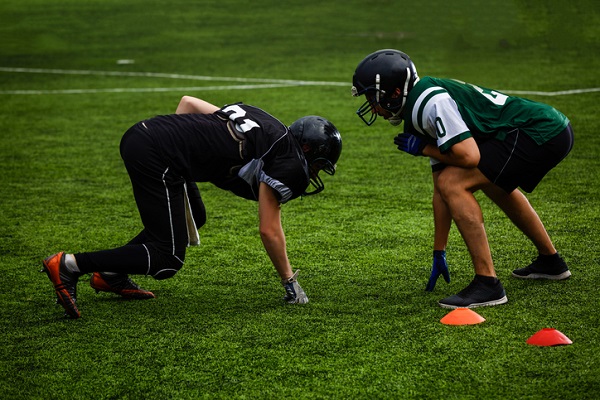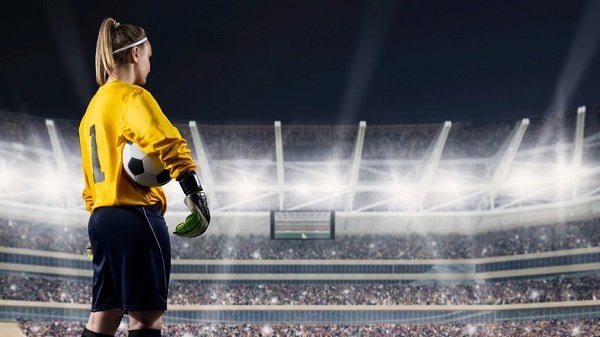Competitive sports present unique mental health challenges, with greater risks of mental illness and a high-performance culture that often stigmatizes disclosure. In the past few years, athletes and coaches have drawn public attention to mental health risks in sports, a cause championed by figures as varied—and prominent—as Toronto Maple Leafs head coach Mike Babcock and New York Giants receiver Brandon Marshall (Fox, 2017; Gleeson, 2017).
Yet, mental illness enters the picture long before packed stadiums and professional contracts. In 2016, Brock University researchers found that mental illness was significantly more common among Canadian student athletes than their non-athlete peers (SAMHI, 2017). From brain injury and readiness to play, to performance anxiety and depression, sports pose complex mental health risks at all levels. Here is a closer look at mental health in sports, which considers brain injuries, unique mental health risks, and possible avenues for wellness careers.
Pro Sports Highlight the Mental Health Risks of Brain Injuries
A top priority for mental health advocates in contact sports, chronic traumatic encephalopathy (CTE) is a type of degenerative brain disease that arises from repeat concussive impact. CTE often leads to neurological decline, and is known to cause mental health disorders including depression and impulsiveness (Taylor, 2017). This injury is especially common in football, with a recent Boston University study detecting CTE in 110 of 111 brains donated by former NFL players.
Alerting the larger public to the risks facing athletes, new brain research is changing the conversation on mental health in sports. In particular, CTE findings have challenged a tendency in competitive sports to prioritize game-day readiness over long-term wellbeing. At all ages and skill levels, athletes are increasingly encouraged to disclose hidden symptoms and mental health struggles—breaking a larger sports-world stigma that also extends to performance anxiety and depression.

Pro sports can shape mental health conversations between parents, coaches, and children
Athletes Are at Greater Risk of Mental Health Disorders
In individual or team sports, the expectations placed on athletes can prove a heavy mental burden. Responding to a Michigan University survey, 63 per cent of student athletes reported an “emotional or mental health issue” that affected athletic performance (Gnagey, 2015). Sports often breed perfectionism and compulsivity—and routinely expose athletes to the major highs and lows of competition. In a recent NCAA survey, nearly a third of participants reported feeling depressed, and half reported feelings of anxiety over the course of the year (Gleeson and Brady, 2018).
Beyond competition pressures, mental health risks are complicated by factors like overtraining, injury, and retirement. Keeping athletes from their passion, long-term injuries can produce a sense of purposelessness or lost identity. Retirement often provokes similar feelings, especially as athletes typically end their careers while still relatively young (Rice et al., 2016). Compounding mental health issues, struggling athletes sometimes turn to drugs and alcohol as coping mechanisms.
Students in Counsellor Training Can Prepare to Help
Students in professional counsellor training can anticipate opportunities to make a difference and help others in this field. In its 2015 mental health pilot program, the University of Michigan noted that 96 per cent of participating student athletes said they would implement what they had learnt to help themselves or others. Moreover, 92 per cent of participants in drop-in clinics said they would use “coping skills and other strategies learned during the sessions” (Gnagey, 2015). With combined skills in life coaching and mental wellness, counsellors can help restore balance between athletic objectives and overall wellbeing.
Demand for counselling services is likely to increase with greater awareness of the unique mental health risks facing athletes. In Canada, these awareness efforts are carried out by organizations like the Student-Athlete Mental Health Initiative (SAMHI) and the Canadian Centre for Mental Health and Sports, launched just last year (Huber, 2018). Throughout their counsellor training, students can follow these developments in athlete mental health—a potential avenue in need of trained and caring professionals looking to make a difference.

Counsellors can help student-athletes juggle the demands of school and sports
Are you hoping to work with athletes after your professional counsellor diploma?
Find out how Rhodes Wellness College can help you get started!
Works Cited
Fox, L. (2017). Maple Leafs’ Babcock working to change mental health conversation. Sportsnet. Retrieved from: https://www.sportsnet.ca/hockey/nhl/maple-leafs-babcock-working-change-mental-health-conversation/
Gleeson, S. (2017). Brandon Marshall delivers powerful messages to owners about mental health. USA Today. Retrieved from: https://www.usatoday.com/story/sports/nfl/2017/07/26/brandon-marshall-nfl-owners-mental-health/511747001/
Gleeson, S. E. Brady. (2018). When athletes share their battles with mental illness. USA Today. Retrieved from: https://www.usatoday.com/story/sports/2017/08/30/michael-phelps-brandon-marshall-mental-health-battles-royce-white-jerry-west/596857001/
Gnagey, L. T. (2015). U-M pilot program confirms need to support student-athlete mental health. The University Record. Retrieved from: https://record.umich.edu/articles/u-m-pilot-program-confirms-need-support-student-athlete-mental-health
Huber, M. F. (2018). U.S. Athletes Need Better Mental Health Care. Outside Online. Retrieved from: https://www.outsideonline.com/2306711/american-athletes-need-better-mental-healthcare
Rice, S. M. et al. (2016). “The Mental Health of Elite Athletes: A Narrative Systematic Review.” Sports Medicine, 46 (9): pp. 1333-1353. Accessed from: https://www.ncbi.nlm.nih.gov/pmc/articles/PMC4996886/
SAMHI. (2017). Student-Athlete Mental Health Initiative: U SPORTS Annual General Meeting. Retrieved from: https://usports.ca/uploads/cis/special_events/AGM/2016-17/presentations/AGM_presentation_notes.pdf
Taylor, C. (2017). CTE is a serious problem in sports, but it’s not too late to save most games. The Globe and Mail. Retrieved from: https://www.theglobeandmail.com/opinion/cte-is-a-serious-problem-in-sports-but-its-not-too-late-to-save-most-games/article35833323/










